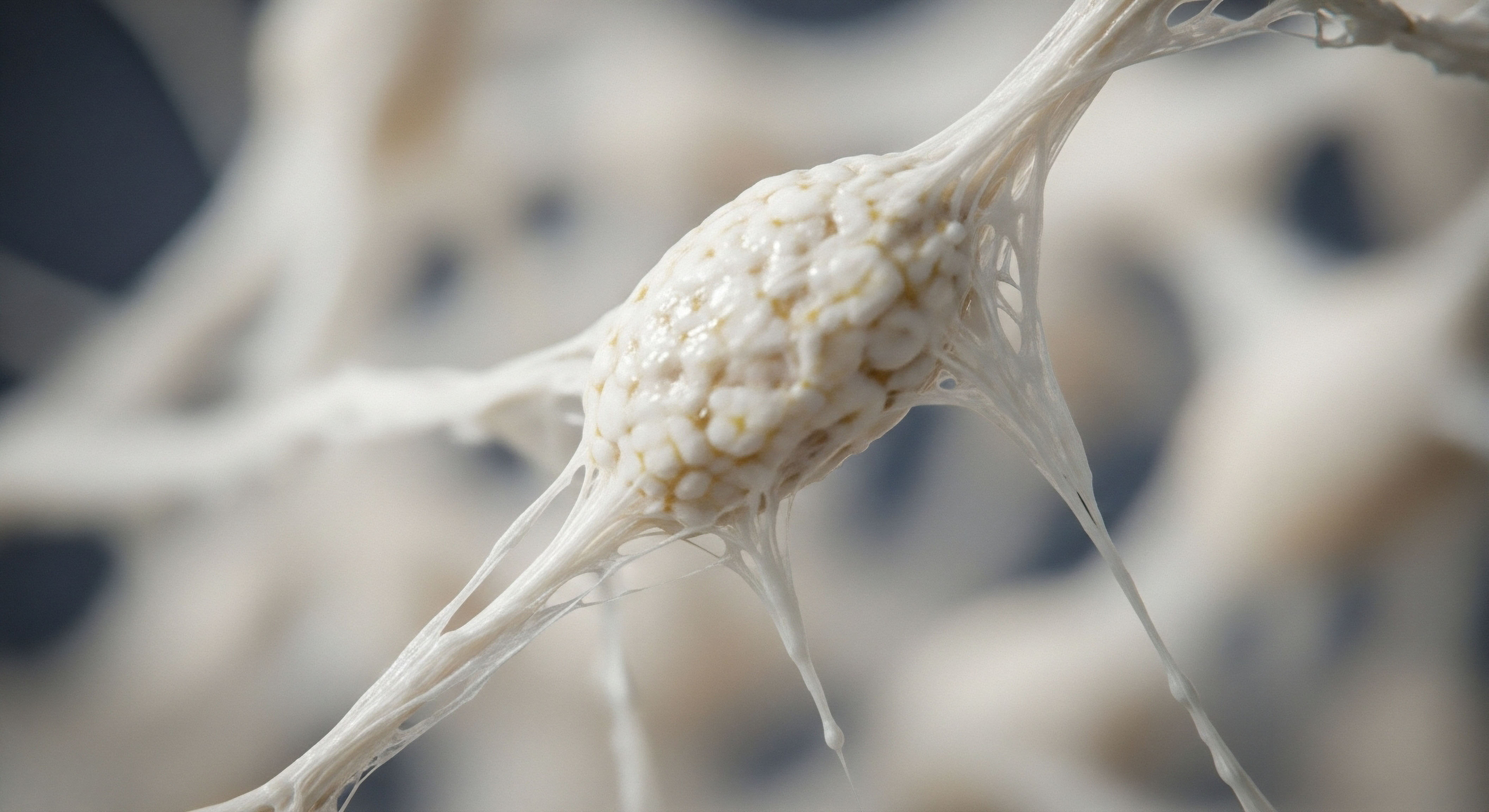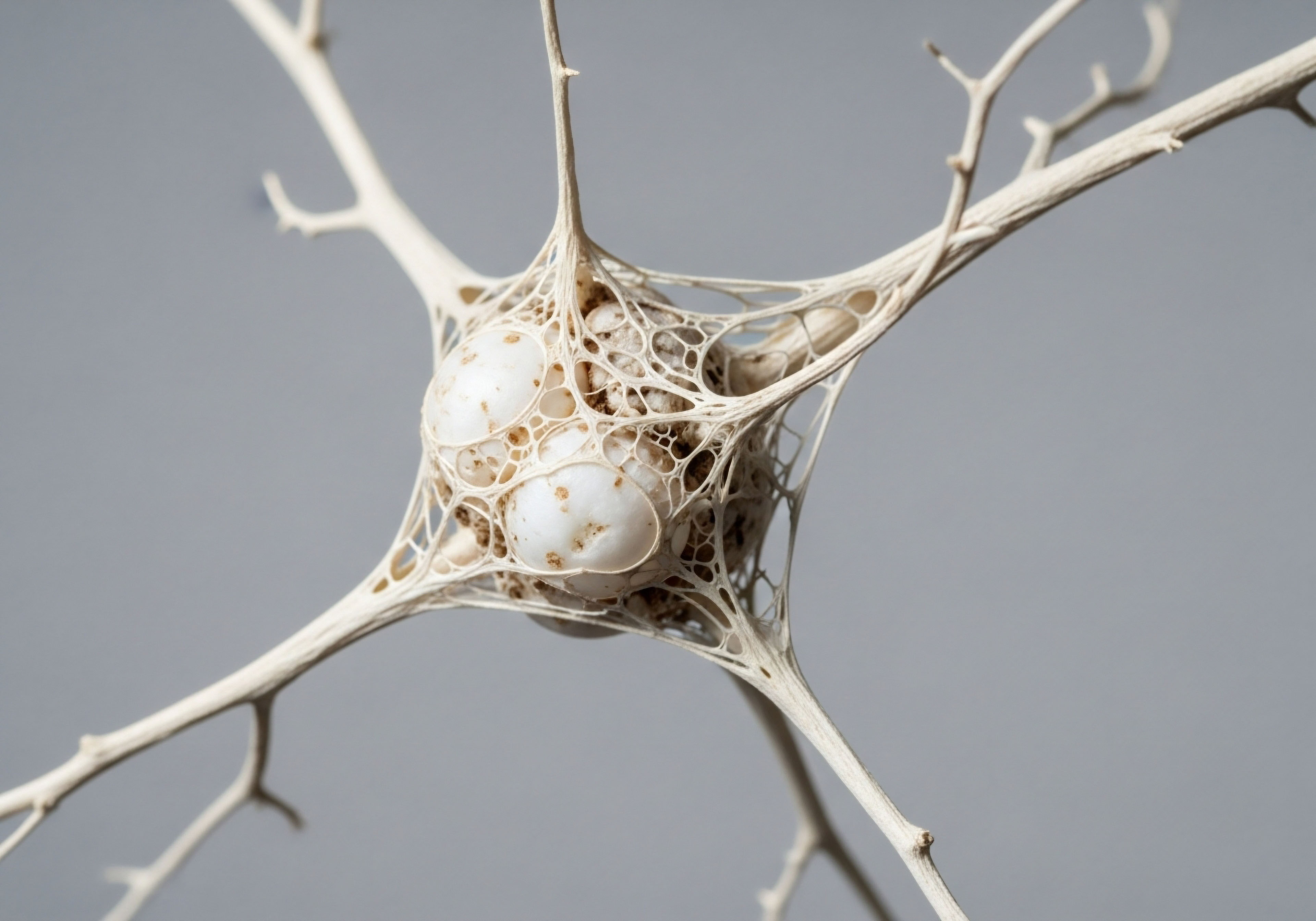

Fundamentals
That subtle shift in your cognitive sharpness, the moment you walk into a room and forget why you entered, or the name that sits just on the tip of your tongue ∞ these experiences are deeply personal and can be unsettling. They are real, tangible signals from your body’s intricate internal communication network.
Your capacity for clear thought, memory recall, and focused attention is profoundly linked to the elegant, silent symphony of your hormones. Understanding this connection is the first step toward reclaiming your mental vitality. We can approach cognitive resilience as a biological system, one that can be precisely understood, supported, and ultimately, optimized.
At the very center of this system is the endocrine network, a collection of glands that produce and secrete hormones, which function as powerful chemical messengers. These molecules travel throughout your bloodstream, instructing cells and organs on how to function. Think of them as the executive directives in a vast, complex organization.
When these directives are clear, consistent, and delivered on time, the entire system operates with seamless efficiency. When the messages become garbled, delayed, or absent, functions like memory, mood, and focus begin to show signs of strain.

The Core Communication Axis
The primary control system governing many of these processes is the Hypothalamic-Pituitary-Gonadal (HPG) axis. This is a three-way communication pathway connecting the brain to the reproductive organs. The hypothalamus, a small region at the base of your brain, acts as the command center.
It sends signals to the pituitary gland, the master gland, which in turn releases hormones that travel to the gonads (testes in men, ovaries in women). The gonads then produce the key hormones that define so much of our function ∞ testosterone and estrogen. This entire system operates on a feedback loop.
When hormone levels are optimal, the gonads send a signal back to the brain to slow production. When levels are low, the brain calls for more. Age, stress, and lifestyle factors can disrupt this delicate feedback mechanism, leading to the hormonal deficiencies that impact cognitive health.

Hormones That Shape Your Thoughts
Several key hormones have a direct and profound impact on brain function. Testosterone, often associated with male characteristics, is a critical neuroprotective hormone in both men and women. It supports dopamine levels, the neurotransmitter associated with motivation, focus, and reward.
Estrogen, primarily a female hormone, is fundamental for healthy neuronal function, supporting the production of acetylcholine, a neurotransmitter essential for memory and learning. Progesterone has a calming, GABA-ergic effect on the brain, promoting relaxation and restorative sleep. Cortisol, the primary stress hormone, is necessary in short bursts for survival, but chronically elevated levels can be toxic to brain cells, particularly in the hippocampus, the brain’s memory center.

Foundational Pillars of Cognitive Support
Before considering any advanced clinical strategy, it is essential to establish a foundation of lifestyle practices that support the entire biological system. These pillars create an internal environment where hormonal signals can be sent and received with clarity. They are the bedrock upon which targeted therapies can be built for maximum effect.
- Restorative Sleep ∞ During deep sleep, the brain undergoes a remarkable cleansing process. The glymphatic system actively clears out metabolic waste products that accumulate during waking hours. Inadequate sleep disrupts this process and simultaneously elevates cortisol levels, creating a state of chronic stress that impairs memory consolidation and executive function. Prioritizing seven to nine hours of quality sleep per night is a non-negotiable requirement for cognitive resilience.
- Neuro-Supportive Nutrition ∞ The brain is composed largely of fat and is an energy-intensive organ. It requires a steady supply of high-quality nutrients to function optimally. A diet rich in healthy fats, such as omega-3 fatty acids found in wild-caught fish, provides the raw materials for building healthy brain cell membranes. Antioxidants from colorful fruits and vegetables protect brain cells from oxidative stress, a form of cellular damage. Limiting processed sugars and refined carbohydrates helps to stabilize blood sugar and insulin levels, preventing the energy crashes and inflammation that contribute to brain fog.
- Consistent Physical Movement ∞ Exercise is one of the most powerful modulators of brain health. Physical activity increases blood flow to the brain, delivering more oxygen and nutrients. It also stimulates the release of Brain-Derived Neurotrophic Factor (BDNF), a protein that acts like a fertilizer for brain cells, promoting the growth of new neurons and the formation of new connections. This process, known as neurogenesis, is central to learning and memory.
- Active Stress Management ∞ The relentless pressures of modern life can lead to chronically elevated cortisol levels. This hormonal imbalance can shrink the prefrontal cortex, the area of the brain responsible for memory and learning. Practices such as mindfulness, meditation, deep breathing exercises, or even spending time in nature can activate the body’s relaxation response, lowering cortisol and creating a more favorable biochemical environment for cognitive function.
By addressing these four pillars, you are actively tuning your body’s internal environment. You are supporting the HPG axis, providing the brain with the resources it needs to thrive, and mitigating the damaging effects of chronic stress. This foundational work creates a state of stability, making the body more receptive to the targeted hormonal strategies that can address specific deficiencies and unlock a higher level of cognitive performance.


Intermediate
Building upon a foundation of supportive lifestyle habits allows for a more precise and effective application of clinical protocols. When sleep, nutrition, and stress are managed, the body’s baseline hormonal signaling becomes clearer, making it possible to identify and address specific deficiencies with targeted interventions.
These strategies are designed to restore hormonal parameters to a youthful, optimal range, thereby recalibrating the biochemical environment that governs cognitive function. The synergy between these two approaches, lifestyle and clinical, creates a powerful effect where each component enhances the efficacy of the other.

Male Cognitive Function and Androgen Support
For many men, the gradual decline in testosterone production, a condition known as andropause, is accompanied by noticeable changes in mental acuity, motivation, and mood. This is a direct consequence of testosterone’s role as a key modulator of neurotransmitter systems in the brain. Restoring testosterone levels through a carefully managed protocol can have a significant impact on cognitive vitality.

The TRT Protocol for Cognitive Vitality
A standard, clinically supervised Testosterone Replacement Therapy (TRT) protocol is designed to re-establish physiological hormone levels and manage potential side effects. The goal is to mimic the body’s natural production, providing a steady state of hormonal support. This approach directly influences brain function by enhancing dopamine release, promoting neuronal survival, and reducing neuroinflammation.
Systematic hormonal optimization provides the brain with the necessary biochemical signals to maintain and repair neural circuits.
The protocol typically involves several components working in concert:
| Component | Typical Administration | Mechanism of Action and Cognitive Benefit |
|---|---|---|
| Testosterone Cypionate | Weekly intramuscular or subcutaneous injection | This bioidentical hormone restores circulating testosterone levels. In the brain, it binds to androgen receptors, directly influencing gene expression related to neuronal health. It supports dopamine synthesis, which is critical for focus, drive, and executive function. |
| Gonadorelin | Twice-weekly subcutaneous injection | This peptide mimics Gonadotropin-Releasing Hormone (GnRH), stimulating the pituitary gland to produce Luteinizing Hormone (LH) and Follicle-Stimulating Hormone (FSH). This maintains the natural function of the HPG axis, preventing testicular atrophy and preserving endogenous testosterone production. |
| Anastrozole | Twice-weekly oral tablet | As an aromatase inhibitor, Anastrozole blocks the conversion of testosterone into estrogen. This is crucial for managing potential side effects like water retention and ensuring that the therapeutic benefits of testosterone are maximized without creating an imbalance with estrogen. |
| Enclomiphene | Optional oral medication | This selective estrogen receptor modulator can be included to further support LH and FSH production, providing an additional layer of support for the body’s natural hormonal signaling pathways. |

Female Cognitive Clarity through Hormonal Recalibration
The perimenopausal and postmenopausal transitions represent one of the most significant shifts in a woman’s hormonal landscape. The fluctuating and eventual decline of estrogen and progesterone levels can profoundly impact cognitive function, leading to symptoms often described as “brain fog,” memory lapses, and difficulty with word recall. Hormonal strategies for women are aimed at smoothing this transition and restoring the neuroprotective benefits of these key hormones.

Navigating Perimenopause and Beyond
Protocols for women are highly personalized, taking into account their menopausal status and specific symptom profile. The primary goal is to replenish the hormones that are critical for neurological health, thereby alleviating cognitive symptoms and supporting overall well-being.
- Low-Dose Testosterone ∞ Often overlooked in female health, testosterone plays a vital role in a woman’s libido, energy, and cognitive function. A low, carefully calibrated weekly dose of Testosterone Cypionate can restore motivation, mental clarity, and a sense of vitality.
- Bioidentical Progesterone ∞ Progesterone has a calming effect on the central nervous system. Supplementing with oral progesterone, particularly at night, can dramatically improve sleep quality. This enhancement of restorative sleep is directly linked to improved memory consolidation and daytime cognitive performance.
- Estrogen Replacement ∞ For many women, replacing declining estrogen levels is the most effective way to combat cognitive symptoms. Estrogen supports cerebral blood flow, protects neurons from oxidative stress, and modulates the activity of key neurotransmitters like serotonin and acetylcholine, which are essential for mood and memory.

How Does Exercise Amplify Hormonal Signals?
Physical exercise acts as a powerful synergist to hormonal therapies. While hormonal optimization sets the stage by providing the correct biochemical signals, exercise enhances the body’s ability to respond to those signals. One of the most important mechanisms is through the improvement of insulin sensitivity.
An insulin-resistant state, often caused by a sedentary lifestyle and poor diet, is highly inflammatory and impairs the brain’s ability to utilize glucose for energy. Regular exercise makes cells more sensitive to insulin, reducing inflammation and ensuring the brain has access to the fuel it needs. Furthermore, exercise triggers the release of BDNF, which amplifies the neuro-regenerative effects of hormones like testosterone, leading to enhanced synaptic plasticity and cognitive resilience.

Nutritional Protocols for Neuroprotection
A targeted nutritional strategy provides the essential building blocks that the brain needs to translate hormonal signals into healthy function. The MIND diet, a hybrid of the Mediterranean and DASH diets, has been specifically designed to support brain health. It emphasizes the consumption of foods rich in specific neuroprotective compounds:
- Polyphenols and Antioxidants ∞ Found in berries, leafy greens, and dark chocolate, these compounds combat oxidative stress, protecting delicate neuronal structures from damage.
- Omega-3 Fatty Acids ∞ Abundant in fatty fish like salmon, these fats are a primary structural component of brain cell membranes. They ensure the fluidity and integrity of these membranes, which is essential for efficient neurotransmission.
- B Vitamins ∞ Found in whole grains, legumes, and lean meats, B vitamins are critical cofactors in the synthesis of neurotransmitters and the maintenance of the myelin sheath that insulates nerve fibers.
By combining these targeted lifestyle interventions with precise hormonal protocols, it becomes possible to create a comprehensive, multi-layered strategy for enhancing and preserving cognitive function throughout the aging process.


Academic
A sophisticated analysis of cognitive resilience requires a systems-biology perspective, examining the intricate interplay between the endocrine, nervous, and immune systems. Hormonal strategies and lifestyle interventions succeed when they address the underlying molecular and cellular dysfunctions that compromise cognitive health.
The primary path of investigation leads to the intersection of neuroinflammation, metabolic dysregulation, and the decline in neurotrophic factors. Addressing these three domains in a coordinated fashion is the cornerstone of a scientifically robust protocol for preserving long-term cognitive capital.

The Neuroinflammatory Cascade in Hormonal Decline
The brain possesses its own resident immune cells, known as microglia. In a healthy state, these cells perform housekeeping functions, clearing cellular debris and protecting against pathogens. However, in a state of hormonal imbalance, they can become chronically activated, shifting from a neuroprotective to a neuroinflammatory phenotype.
The decline in sex hormones like testosterone and estradiol is a key trigger for this shift. Both of these hormones exert powerful anti-inflammatory effects within the central nervous system. Their absence removes a critical braking mechanism on microglial activation.
When microglia become chronically activated, they release a cascade of pro-inflammatory cytokines, such as Tumor Necrosis Factor-alpha (TNF-α) and Interleukin-6 (IL-6). These cytokines disrupt synaptic function, impair long-term potentiation (the cellular basis of memory), and can even trigger apoptosis (programmed cell death) in neurons.
This state of chronic, low-grade neuroinflammation is a hallmark of age-related cognitive decline and neurodegenerative diseases. Hormonal optimization, specifically the restoration of physiological testosterone and estradiol levels, directly suppresses microglial activation and reduces the production of these damaging cytokines, thereby restoring a less inflammatory, more neuroprotective brain environment.

Metabolic Dysfunction and Cerebral Hypometabolism
The brain is the most energy-demanding organ in the body, consuming approximately 20% of total glucose utilization. Its ability to effectively use this fuel is paramount for all cognitive processes. A growing body of evidence has illuminated the profound connection between systemic insulin resistance and cognitive dysfunction, a link so strong that Alzheimer’s disease is sometimes referred to as “Type 3 Diabetes.”
Insulin resistance, a condition where peripheral cells become less responsive to the effects of insulin, leads to chronically high levels of both glucose and insulin in the bloodstream (hyperglycemia and hyperinsulinemia). This state promotes systemic inflammation, which, as discussed, contributes to neuroinflammation.
Furthermore, the insulin receptors in the brain play a crucial role in synaptic plasticity and neuronal survival. When the brain itself becomes insulin resistant, it leads to a state of cerebral hypometabolism, where neurons are effectively starved of energy despite an abundance of glucose in the blood.
This energy crisis impairs neurotransmitter synthesis, synaptic function, and overall neuronal health. Hormonal optimization protocols, particularly TRT in men, have been shown to improve systemic insulin sensitivity. This, combined with lifestyle interventions such as a low-glycemic or ketogenic diet and regular exercise, can restore metabolic flexibility and ensure the brain has a consistent and efficient energy supply.
The synergy of hormonal balance and metabolic health provides a robust defense against age-associated neurodegeneration.

What Is the Role of BDNF in Synaptic Plasticity?
Brain-Derived Neurotrophic Factor (BDNF) is a master regulator of synaptic plasticity, the brain’s ability to form, strengthen, and prune connections between neurons. This process is the physical basis of learning and memory. Higher levels of BDNF are associated with improved cognitive function and a lower risk of neurodegenerative disease. Both hormonal status and lifestyle factors are powerful modulators of BDNF expression.
Testosterone has been shown to increase the expression of BDNF in the hippocampus and prefrontal cortex, the two brain regions most critical for memory and executive function. It appears to do this by directly acting on androgen receptors within neurons, triggering the signaling cascades that lead to BDNF gene transcription.
Physical exercise is perhaps the most potent non-pharmacological stimulus for BDNF production. During exercise, muscles release a hormone called irisin, which crosses the blood-brain barrier and stimulates BDNF expression. The combination of optimal testosterone levels and a consistent exercise regimen creates a powerful synergistic effect, bathing the brain in the very protein it needs to grow, adapt, and maintain its resilience.
| Intervention | Primary Biomarker Impact | Mechanism of Cognitive Enhancement |
|---|---|---|
| Testosterone Replacement Therapy (TRT) | Increased free testosterone; Reduced SHBG; Normalized estradiol | Directly increases BDNF expression in the hippocampus; Modulates dopamine synthesis; Reduces neuroinflammation by suppressing microglial activation. |
| Targeted Nutritional Ketosis | Reduced HOMA-IR; Increased beta-hydroxybutyrate (BHB); Lowered hs-CRP | Provides an alternative fuel source (ketones) for the brain, bypassing glucose hypometabolism; BHB itself acts as a signaling molecule, reducing oxidative stress. |
| High-Intensity Interval Training (HIIT) | Increased BDNF; Improved insulin sensitivity (lower HOMA-IR); Reduced cortisol | Stimulates release of irisin, which boosts BDNF; Enhances cerebral blood flow and glucose uptake; Mitigates the neurotoxic effects of chronic stress. |
| Growth Hormone Peptide Therapy (e.g. Sermorelin/Ipamorelin) | Increased IGF-1; Improved sleep architecture (deep wave sleep) | IGF-1 is neuroprotective and supports neuronal growth; Enhanced deep sleep optimizes glymphatic clearance of metabolic waste products like amyloid-beta. |

Advanced Peptide Protocols for Cognitive Enhancement
Peptide therapies represent a more targeted approach to supporting the systems that underpin cognitive health. These are short chains of amino acids that act as precise signaling molecules. Therapies utilizing Growth Hormone Releasing Hormones (GHRHs) like Sermorelin, or Growth Hormone Releasing Peptides (GHRPs) like Ipamorelin, stimulate the pituitary gland to produce a more youthful, pulsatile release of Growth Hormone (GH).
The primary cognitive benefit of this optimization is a profound improvement in sleep quality, specifically an increase in the duration and intensity of deep wave sleep. It is during this sleep stage that the brain’s glymphatic system is most active, clearing out neurotoxic waste products.
By enhancing this natural clearance process, these peptides help to maintain a cleaner, more efficient neuronal environment. Therapies like Tesamorelin, which specifically reduces visceral adipose tissue, can also have indirect cognitive benefits by lowering the systemic inflammatory load associated with this type of fat.

References
- Penelope. “Navigating Menopause-Related Cognitive Changes Through Lifestyle Strategies.” 2023.
- Mega Lifesciences. “Boost Cognitive Resilience & Mental Strength | Brain Health Tips.” 2024.
- Janus, C. and V. T. R. M. S. R. V. M. V. J. K. J. F. R. E. A. P. S. S. S. A. D. J. M. K. R. S. D. V. K. G. S. J. D. J. M. A. C. D. J. M. A. C. B. A. S. R. K. J. F. R. E. A. P. S. S. S. A. D. J. M. K. R. S. D. V. K. G. S. J. D. J. M. A. C. “Cognitive Resilience in Brain Health and Dementia Research.” PMC, 2022.
- “Enhancing cognitive resilience ∞ a narrative review of lifestyle interventions in cognitive decline prevention among older adults.” ResearchGate, 2024.
- “Lifestyle strategies for preventing memory decline.” Johns Hopkins Medicine.
- Beauchamp, M. H. & P. S. “The role of testosterone in cognitive function and dementia in men ∞ a systematic review.” Annals of the New York Academy of Sciences, vol. 1052, 2005, pp. 149-61.
- Gleason, C. E. et al. “Effects of Hormone Therapy on Cognition and Mood in Recently Postmenopausal Women ∞ Findings from the Randomized, Controlled KEEPS-Cognitive and Affective Study.” PLoS Medicine, vol. 12, no. 6, 2015, e1001833.
- Villeda, S. A. et al. “The ageing systemic milieu negatively regulates neurogenesis and cognitive function.” Nature, vol. 477, no. 7362, 2011, pp. 90-4.
- Craft, S. “Insulin resistance syndrome and Alzheimer’s disease ∞ age- and obesity-related effects on memory, amyloid, and inflammation.” Neurobiology of Aging, vol. 26, suppl. 1, 2005, pp. 65-9.
- Erickson, K. I. et al. “Exercise training increases size of hippocampus and improves memory.” Proceedings of the National Academy of Sciences, vol. 108, no. 7, 2011, pp. 3017-22.

Reflection
The information presented here functions as a detailed biological map. It illustrates the known pathways, the key intersections, and the powerful forces that shape your cognitive landscape. This map can show you the terrain of your own physiology, revealing how the silent messages of your hormones and the daily choices you make converge to determine your mental clarity and resilience.
It provides a framework for understanding the profound connection between how you feel and how your body is functioning on a cellular level.
This knowledge is the starting point. The true work begins with introspection and self-awareness. How does your energy shift throughout the day? When is your focus sharpest? What lifestyle factors seem to dull your cognitive edge? Your lived experience is the most valuable dataset you possess. Viewing these personal observations through the lens of hormonal and metabolic health can transform them from frustrating symptoms into actionable information.
Embarking on a path to optimize your cognitive health is a proactive act of biological stewardship. It is a decision to engage with your own physiology, to understand its language, and to provide it with the specific support it needs to function at its peak. This journey is inherently personal.
While the principles are universal, the application is unique to you. The ultimate goal is to move through life with a brain that is not just free from disease, but one that is vibrant, resilient, and capable of engaging fully with the world.



